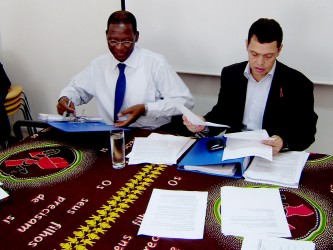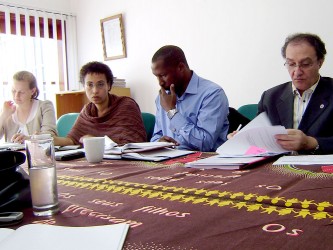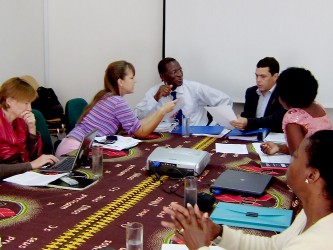
The latest update from Mozambique is that we are in the midst of an intensive period of activity supporting the Government of Mozambique to develop its round 9 application to the Global Fund to fight HIV/AIDS, TB and malaria (GFATM). I was in a meeting of Mozambique's Country Coordination Mechanism (CCM) held at the UNAIDS office in the leafy Sommerschield Bairo of Maputo last week. The picture shows the chair of the CCM, Narciso Matos, and the UNAIDS country representative, Mauricio Cysne, who chaired and co-chaired the meeting. Note the table cloth - which is printed with an HIV/AIDS awareness message stating "your children need you".

I also attach a picture showing Dr. Benzerroug, the WHO country representative, and Diogo Milagre, of the National AIDS Council (who I have a mentioned previously). Alongside Diogo is Eduarda Cipriano, of the Mozambican NGO, FDC, and next to her is Lisa Nelson, the country director of the Mozambique office of the US Government's Centre for Disease Control here in Maputo, who is a new member of the CCM.
The role of the CCM is to provide oversight of the application process for Global Fund financing, signing off the final proposal and then providing oversight of the subsequent grant implementation. The meeting last week was just one of a series of meetings that the CCM has had and will continue to have up until the applications are finally submitted in about a months time.
Applying to the global fund involves very high stakes. At present Mozambique receives over $50m per year from the Fund in support of national programmes to combat the three diseases. In the most recent round 8 application Mozambique secured financing to help strengthen its health system, but failed to secure additional funding for its national HIV/AIDS and malaria response. That failure will potentially have severe consequences, particularly if the round 9 application is unsuccessful. The stakes are high because of the high level of dependence of Mozambique on Global Fund financing. A significant proportion of available funding currently procures anti-retroviral drugs (ARVs) and other essential medicines and materials (such as malaria treatments and insecticide treated bed nets to prevent malaria). Unless round 9 funding is secured, GFATM funding to Mozambique will fall from over $50 million per year to less than $20 million in 2010, and there is a very real risk that access to essential drugs and equipment will be compromised.
One of the greatest challenges facing the Global Fund is how to maintain its core principle of being a performance based funding instrument, providing significant funding in a timely way to countries that demonstrate a capacity to use the funds effectively, with the need to provide reliable and predictable funding to countries like Mozambique, that have a good development track record but which have had difficulty complying with the strict reporting requirements to secure timely fund release.
I have mentioned in previous blogs that Mozambique is considered something of a success in development terms, in that it has a well established mechanism for coordinating donor support at the country level. The signing of the International Health Partnership compact at the country level, was an indication of the commitment of partners at the country level to increasingly provide funds in line with national priorities and through national funding mechanisms. Mozambique was one of the first countries where the Global Fund committed resources directly in to a common basket of funds to directly support the overall plans of the health sector. Whilst the initial success of the partnership with the Global Fund, in terms of demonstrating the Funds ability to respond flexibly to national priorities was welcome, an ongoing challenge for the Ministry of Health has been to meet the reporting requirements of previous funding rounds. The global funds reporting requirements are often additional to the reporting requirements of the many other donors who support the sector and different from the reporting needs of the other donors who also pool their funding through the common funding mechanism and who have agreed to use a single monitoring and evaluation framework to assess progress. There have been attempts to reconcile these differences, prompted in part by recognition that the reporting requirements and Mozambique's failure to comply in good time have led, in the past, to considerable delays in releasing funds, which delays implementation of essential activities.

Without getting bogged down in the detail, the risk that now faces Mozambique relates to the potential moral hazard of significant falls in funding from GFATM. In Mozambique, where significant numbers of people depend on GFATM financed goods and services, a fall in funding could leave significant numbers of people without essential treatments. Global Fund resources have helped ensure over 130,000 people are receiving ARVs in Mozambique and considerably more are benefiting from malaria treatments or bed nets. However, the failure to secure round 8 HIV/AIDS and malaria funding combined with the human resource constraints that continue to compromise timely reporting on past performance increase the risk that essential drug supplies may dry up unless performance reporting improves and round 9 funding is secured. So, it is all hands on deck in Mozambique at present to shore up the performance reporting system and to produce a credible and realistic plan for further GFATM funding.
Whilst the success of the Global Fund in mobilising significant additional resources globally to fight the three diseases is to be applauded, the fund needs to continue the process of evolution from significant catalytic fund for a scaled up response in to a more reliable and predictable long term funding source which supports systematic efforts to strengthen national capacity to tackle the three diseases over the long term and in a sustainable way.
So, the stakes in this current round application process are very high. There is a real chance that funds may not be secured and the consequence of this would be devastating. But for now, at the country level, we are totally focused on succeeding. We are gritting our teeth and doing whatever is necessary to try to secure round 9 funding. It's a bit of a roller coaster ride and it will be late in the year before we know the outcome, but we all have our fingers crossed for a positive outcome.

4 comments
Comment by Vinay Nair posted on
Really interesting blog, Neil. I think you're right to talk about moral hazard. This will be an increasingly testy issue that GFATM needs to deal with head-on (particularly until some normalcy returns to large donors' national balance sheets). I also think your comments about IHP and Moz’s success in development terms give great context; this nuance can get often lost in translation with GFATM proposals, both in our preparation and their evaluation. All hands to the pump for Round 9 – yes, we can!
Comment by Jim Campbell posted on
Neil - the approach you describe outlines some of the many positive elements of the cooperation in Mozambique. It's particularly welcoming to note that CDC is amongst your group so that there will be enhanced synergy between potential GFATM activities and those implemented with PEPFAR funding.
If your group has not already looked at it I would recommend the guide from Physicians for Human Rights on Round 9 applications:
http://physiciansforhumanrights.org/library/documents/reports/round9-gf-hss-guide.pdf
and the guide from PEPFAR on their Partnership Frameworks:
http://www.pepfar.gov/guidance/index.htm
Demonstrating how GFATM can align to the IHP Country Compact and the PEPFAR Partnership Framework will be a new avenue of development cooperation that fully supports the Accra/Paris principles and the leadership of the Mozambique MoH.
Beyond this, I think there is a much needed discussion amongst the Board of the GFATM at their next meeting on their responsibility to provide predictable, long-term financing in cases such as Mozambique. And for these messages to be clearly stated to the Technical Review Panel in advance of review and grant decisions. Keep blogging on this if you can!
Regards,
Jim
Comment by Chiara Frisone posted on
Excellent blog, very very helpful. Many thanks!
Comment by Rhoda Lewa posted on
Insightful!